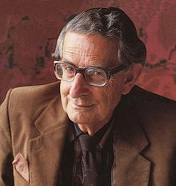Whatever happened to Hans Eysenck?
 Psychologist Hans Eysenck was once one of the most cited and controversial scientists on the planet and a major force in the development of psychology but he now barely merits a mention. Whatever happened to Hans Eysenck?
Psychologist Hans Eysenck was once one of the most cited and controversial scientists on the planet and a major force in the development of psychology but he now barely merits a mention. Whatever happened to Hans Eysenck?
To start off, it’s probably worth noting that Eysenck did a lot to ensure his legacy would be difficult to maintain. He specifically discouraged an ‘Eysenck school’ of psychology and encouraged people to question all his ideas – an important and humble move considering that history favours the arrogant.
But he also argued for a lot of rubbish and that is what he’s become most remembered for.
He did a lot of work on IQ but took a hard line of its significance. Rather than thinking of it as simply a broad-based psychological test that is useful as a clinical measure of outcome, he persistently championed it as a measure of ‘intelligence’ – a fuzzy social idea that implies someone’s value.
Without any insight into the cultural specificity of these tests Eysenck argued for racial differences in IQ as likely based in genetics, and signed the notorious ‘Mainstream Science on Intelligence’ statement which reads like your drunk grandpa trying to justify why there are no black Nobel science winners.
Eysenck was apparently not racist himself, but believing that science was ‘value free’ he was also incredibly politically naive and took money from clearly racist organisations or published in their journals, thinking that the data would speak for itself.
He also doubted that smoking caused lung cancer and took money from tobacco giant Philip Morris to try and show that the link was mediated by personality, and at one point started espousing that there was some statistical basis behind astrology.
Some of his other main interests have not been rejected, but have just become less popular – not least the psychology of personality and personality tests.
This area is still important but has become a minority sport in contemporary psychology, whereas previously it was central to a field that was still battling fairytale Freudian theories as a way of understanding personal tendencies.
But perhaps his most important contributions to psychology are now so widely accepted that no-one really thinks about their origin.
When he was asked to create the UK’s first training course for clinical psychology he created a scientifically informed approach to understanding which treatments work but extended this philosophy to focus on a hypothesis-testing approach to work with individuals. This is now a core aspect of practice across the world.
His belief that psychologists should consistently look to make links between thoughts, experience, behaviour and biology is something that has been widely taken up by researchers, even if clinical psychologists remain a little neurophobic as a profession.
Because Eysenck loved an academic dust-up, he is most remembered for the IQ debate, on which he took a rigid position which history has, justifiably, not looked kindly on. But as someone who influenced the practice of psychology, his legacy remains important, if largely unappreciated.


Tom Stafford's Blog
- Tom Stafford's profile
- 13 followers



